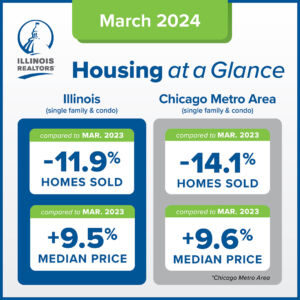 “This is the era of credit counseling and repair,” says Kelly J. Price, Senior Mortgage Loan Consultant with Fifth Third Bank in Chicago and one of several lenders interviewed for a story “Buying a Home in Tight Money Times” in the April Illinois REALTOR® magazine out later this month.
“This is the era of credit counseling and repair,” says Kelly J. Price, Senior Mortgage Loan Consultant with Fifth Third Bank in Chicago and one of several lenders interviewed for a story “Buying a Home in Tight Money Times” in the April Illinois REALTOR® magazine out later this month.
Illinois brokers in a recent Broker Sentiment Survey taken by the Illinois Association of REALTORS® also emphasized the importance of good credit in today’s lending environment. One broker said it’s important for potential homebuyers to “mind their Ps and Qs regarding their credit situation for at least a year prior to applying for a mortgage.”
Credit score guidelines can vary from one lender and loan program to another. Some lenders now offer credit repair services as part of the home loan application process. What is certain is that borrowers need to prepare for stricter requirements. Lenders interviewed for the story cited a range of 720-740 or above for the best rates on conventional loans. A low credit score will require borrowers to make a larger down payment or add the cost of private mortgage insurance.
What can you a buyer do?
A good first step is to order a free credit report from www.annualcreditreport.com, the official site where, by law, you are allowed to obtain one free credit report a year from each of the three major credit reporting agencies (Experian, TransUnion and Equifax). The report will show you any problem areas and incorrect information, which you may be able to correct by writing a dispute letter to the reporting company and creditor. You can find a sample dispute letter at the Federal Trade Commission’s website www.FTC.gov.
IAR has developed a “Credit 101” flyer, available from www.yourillinoishome.com, to help consumers better understand the importance of good credit. Here are some basics for improving your credit score.
- Pay your bills on time. Your payment history, including late payments, can count for more than one-third of your credit score.
- Reduce your credit card and other debt balances. About 30 percent of your credit score depends on the total amount of balances you owe versus your total credit limit.
- Keep older credit lines open. Having a long history of active accounts shows you are a good credit risk.
- Avoid new credit. Opening new credit will lower our average account age.




 Create professional development programs that help REALTORS® strengthen their businesses.
Create professional development programs that help REALTORS® strengthen their businesses.
 Protect private property rights and promote the value of REALTORS®.
Protect private property rights and promote the value of REALTORS®.
 Advance ethics enforcement programs that increase REALTOR® professionalism.
Advance ethics enforcement programs that increase REALTOR® professionalism.
 Protect REALTORS® by providing legal guidance and education.
Protect REALTORS® by providing legal guidance and education. Stay current on industry issues with daily news from Illinois REALTORS®, network with other professionals, attend a seminar, and keep up with industry trends through events throughout the year.
Stay current on industry issues with daily news from Illinois REALTORS®, network with other professionals, attend a seminar, and keep up with industry trends through events throughout the year.






